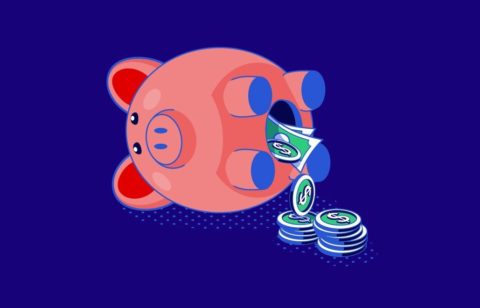
If you’re carrying a lot of credit card debt, you’re in good company. Many Americans are deeply in debt, as household debt levels have been on the rise in recent years. In fact, debt levels have far eclipsed even the staggering high levels reached at the onset of the Great Recession beginning in 2007-2008. As of the last quarterly report from the Center for Microeconomic Data, total household debt in America had reached a whopping $12.96 trillion.
With the recent jumpstart of the economy, consumer confidence is soaring. This makes consumers feel good about spending money on big-ticket items. With lending practices relaxing and interest rates still relatively low, consumers continue to outspend their income by spending and borrowing on credit.
With the economy heating up, inflation is now a concern, and the Federal Reserve will likely continue to raise rates in the coming year. This means that Americans who are carrying credit card and other debt will see their interest rates rise and, in turn, will be paying higher minimum payments to service their credit card debt every month.
These higher payments could put some consumers at risk of falling behind and damaging their credit. If you’re carrying a significant amount of debt, and you’re concerned about the future of interest rates, you may be considering a debt consolidation loan to mitigate this risk. If you are, there are several things to contemplate before making that move.
How have you accumulated so much debt?
Being honest with yourself about how you got yourself in trouble with credit card debt is the first step in deciding if a debt consolidation loan is the right choice. Whether you were the victim of circumstances beyond your control, or your money management skills are not what you want them to be, it’s easy to quickly assume debt.
Spending more than you make
Living above one’s means is very common in America. Credit cards make it all too easy to buy things without you want without really paying for them. It’s easy to overspend, laying down a credit card to obtain something you really want but truly can’t afford. The “buy now, pay later” mentality is what has gotten many Americans in over their heads.
If overspending has been a contributing factor in your accumulation of troublesome debt, you must address this behavior before you take out a consolidation loan. If you don’t, you may find yourself right back in the same situation with your credit card debt. Then, with a consolidation loan and new credit card debt, you’ll have created an even worse situation.
Not having a savings account
If you don’t have an adequate savings account, you’re in the same situation as nearly 70% of all American consumers, according to a recent article by CNBC. This is another big reason why consumers are carrying so much debt. Without cash to address emergency expenditures, ones that all consumers will inevitably face at some point, there’s little other choice than to utilize a credit card to pay for the expense.
If you have little to no savings, you’d be wise to start saving before you consolidate your debt. Set an initial goal of $1,000, but don’t stop there. Keep going, as you can never have too much in savings. Without cash reserves, you’re sure to accumulate more credit card debt after you consolidate your current debt.
Having little to no savings and living above your means are very common reasons why you might fall into credit card debt. It’s worth pointing out that these things are, without question, under your control. If you’re going to get out of debt permanently, you must develop the self-discipline to change your behavior. Otherwise, consolidating your debt could be a very bad decision, one that could make your debt situation much worse.
Income growth not keeping up with the cost of living
For the past decade, income growth has been lagging behind the rising cost of living. Because of this, many people just can’t seem to get ahead and in many cases fall further and further behind with each passing month. Unfortunately, the only way to stay afloat is often to utilize credit cards to bridge the gap between income and expenses. Eventually, the credit card debt will get so big that it becomes unsustainable. If something isn’t done to head off the problem while there’s still time, the situation can end in financial disaster.
If you’re experiencing a budget shortfall every month, you must do one of two things: increase your income by taking on a second job or starting a side business, or trim your expenses down to a manageable level with your current income. If you don’t do this prior to taking out a debt consolidation loan, you’ll likely continue to accumulate credit card debt.
Loss of a job
If you lose your job, especially if you’re the major breadwinner in the family, the effects can be financially devastating. If you have no savings to help you through, the situation could become critical very quickly. If you don’t replace the income quickly, you may have to turn to credit cards just to survive.
Many times, after a job loss, you may face a decision to take a lower paying job while you continue to look for a job to replace the income you were earning. While this is a good strategy because it may enable you to cover essential payments such as your mortgage, car, and healthcare payments, you’ll certainly have budget shortfalls from month to month. This can cause a rapid accumulation of credit card debt.
Once your situation has stabilized, consolidating the debt you’ve accumulated may be a good strategy as long as you feel confident you’ll remain gainfully employed.
Illness or injury
An unexpected illness or an injury can quickly place a financial burden on a family. Even with good medical insurance, the bills can add up. Co-pays, prescriptions, deductibles, and out-of-pocket expenses can add thousands to a family’s debt burden. If the illness or injury prevents you from working, your situation can go from difficult to critical very quickly.
A situation like this could place you in a financial crisis where you’re depending on credit cards just to meet basic needs. Again, having money in a savings account to fall back on could be the difference between surviving and bankruptcy. In addition, if you have access to disability insurance, you may want to consider acquiring it. It could help you through if you’re unable to earn a living.
If you’ve accumulated your credit card debt through a one-time event such as a serious medical issue or an injury, utilizing a debt consolidation loan may help you get that debt paid down.
Divorce
A divorce can have a devastating effect on the finances of a family. Aside from the extreme emotional effects of divorce, the financial effects can be far reaching. While divorce rates have fallen over the past 10 years, it’s still a harsh reality, financial and otherwise, for many American families.
Unfortunately, money is at the heart of any marriage. When divorce strikes a marriage, there’s no getting around the financial aspects of parting ways. Breaking up a household generally means doubling household expenses as each sets up a separate home. In many cases, it takes going before a judge to decide how assets will divide and how the couple will resolve other financial issues. In the meantime, a family can fall behind on bills and run up additional debt while trying to get through month after month.
Once the couple reaches a settlement and the divorce becomes final, a debt consolidation loan can sometimes help clean up any debt accumulated along the way.
Moving forward with a debt consolidation loan
Understanding your individual circumstances is an important step in getting your credit card debt resolved. If you’re in considerable debt, the solution to your problem isn’t an easy one. First, you must address the reasons for your debt problem and make the necessary changes to keep from repeating the same mistakes in the future.
If you feel as though you’ve addressed the issues that have contributed to your debt problem and are ready to move forward with a debt consolidation loan, there are some important things to consider. Understanding the differences between your debt consolidation options is paramount.
Debt consolidation loans offered to consumers are either secured loans or unsecured loans. A secured loan means that the borrower must place something as collateral against the loan, such as his or her home. An unsecured loan means that a borrower is able to obtain a loan with just a signature. You should talk to you lender about the differences between these types of loans and decide which is the best option.
Refinancing your mortgage and taking cash out
A mortgage refinance with cash out entails taking out a new mortgage that pays off your existing mortgage loan balance while allowing you to tap into the equity you have in your home to pay off your debt. While this can be an attractive option, there are potential downsides that you should consider before making this important step.
Mortgage refinance loans with cash out will incur significant closing costs. You can pay these costs upfront or include them in the loan balance, amortized over the life of the loan. Either way, these costs represent a significant sum. If they’re included in the loan balance, you could end up paying a lot of interest on those fees over the life of the loan. Meanwhile, between the money you’ve borrowed to pay off your debt and the closing costs, you have significantly reduced the equity you have in your home.
Furthermore, by rolling your credit card debt into your mortgage balance, you’ve now moved your unsecured debt into a position secured by your home. Your home is most likely your biggest asset. If you’re ever in a position where you cannot afford your refinanced, larger payment, you could be putting your home at risk.
Taking out a Home Equity Line of Credit (HELOC)
Another option to consolidate your debt if you’re a homeowner is a home equity line of credit. A HELOC allows you to tap into the equity in your home and use those funds in any way you desire. Generally, closing costs are low but the same cautions apply. It’s important to understand that since a home equity line of credit places a mortgage on your home, if you’re unable to make your payments, you could be putting your home at risk of foreclosure.
Personal loans
Personal loans are loans provided by banks, finance companies, other lending institutions that are unsecured, meaning there’s no asset put up as collateral. These loans generally require borrowers to have a good credit score and be up to date on payments. They’re best suited for those that have a relatively small amount of debt since most lending institutions limit the amount of money they’ll lend on a personal loan. If you meet these requirements, a personal loan might be a good option.
Act before it’s too late
If you have oppressive credit card debt, it’s important that you act before your situation gets too difficult to solve. Not addressing your credit card problem timely will only make your situation more difficult, and it’ll definitely limit your options in getting it resolved.
If you’re only making minimum payments on your credit card debt, you may feel like you’re holding your own, but that’s a false sense of security. Minimum payments only benefit the credit card company; they’ll cause you to pay an exorbitant amount of interest over a long period. If you can only afford to pay the minimums on your credit cards, you’re very close to insolvency.
If you can no longer pay, you don’t have to declare bankruptcy
Even if your situation has gotten to the point where you cannot qualify for debt consolidation loans, other options are available to you other than bankruptcy. Bankruptcy is a nuclear event for anyone; avoid if possible.
Consider consolidating your debt through debt settlement. National Debt Relief can help you mitigate your debt with your creditors by negotiating a settlement that’ll resolve your debt once and for all.
Regardless of your situation, your goal should be to find the best solution to resolve your debt problem. Getting yourself back on a path to stability requires resolve and hard work. Do your research and find the best path back to financial health for you and your family.





